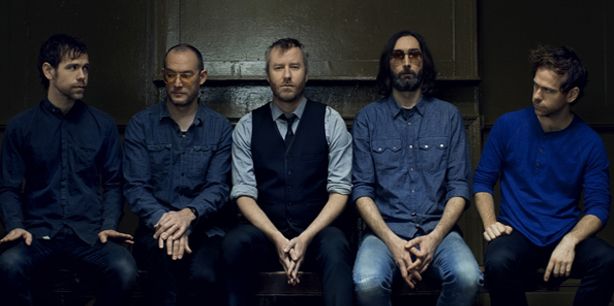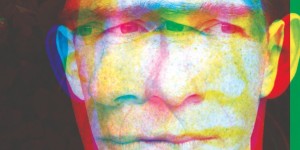 Music
Music
The National face down their demons
by Nicole Villeneuve
June 13, 2013
It’s late at the end of a marathon press day in Toronto by the time we finally get Matt Berninger in front of us for an interview. It’s beautiful out still, but by this hour the sun’s behind the buildings and the room is cast in blue. Everyone’s tired and we’re conscious of not taking too much of his time. It’s basically the consummate awful interview situation—forced to make the best of limited time and place with a subject you want to cover at length. But when he arrives and we can’t help but ask if he’s over it by this time in the day, he reminds us that the band spent too long without anybody asking them anything. He’s open and ready to talk at length. About the National, their new album, his brother’s documentary, sports, kids—whatever. He’s down.
The whole situation lines up kind of perfectly with where the National currently find themselves, weeks before the release of new album Trouble Will Find Me: operating under an assumed darkness with a newfound sense of ease. Though the title seems to suggest they’re still not sure the other shoe won’t drop, Berninger says the constant the fear of losing whatever little traction or spotlight they have has mostly waned.
“We learned incrementally and slowly that all you have control over is the songs that you make and the collection that you put together as a record,” Berninger says. “The rest of it—attention, and buzz, or whatever—that’s not something we were good at being strategic about. The only thing we could trust or try to have faith in was to write songs that we like.”
It’s been more than ten years since the band, transplanted Cincinnati brothers Aaron and Bryce Dessner, Scott and Bryan Devendorf, and lone-wolf Berninger, spent their nights playing for no one in New York City bars. This album is their sixth full-length; the five previous have been stepladders up higher levels of success. The slow burn afforded them not only a gradual acclimatization to the life of a professional musician, but real-life years—age, and experience, and the monumental stuff that comes with that—the ease you hear on Trouble Will Find Me isn’t imagined.
Even at Berninger’s sardonically self-deprecating best, his down-low baritone and the band’s trademark musical tension did a good job of hiding any of the fun in Berninger’s personal/political/generational-crisis torch-bearing lyrical mix bag over the years. Despair, bleakness, release, cautious optimism—these are more commonly thrown at the National’s work. The same could be said about their writing process in years’ past—they were fraught with disagreements stemming from different processes and preferences. Though the end of the massive tour run behind 2010’s High Violet ended satisfactorily for the band, they’d agreed at that point to not begin working on anything else for at least a year, instead taking time to focus on their new and growing families.
“We talked about putting out a record in maybe four years. But when we took the deadline out of it, almost right away, Aaron started sending me ideas,” Berninger says, going on to detail the unprecedented collaborative process that unfolded between himself and Dessner. “He had a newborn and he was going into the studio whenever he could find a moment. He was sleep-deprived, and he was writing things from a less-cerebral part of his brain. I was being pulled into these things.”
Berninger says the band often ruins songs by over-working them. “This was a process of trying to develop them without them falling in on themselves. I think we kind of came to terms with our own process and respected each other’s ways of doing things. We learned to trust each other.”
In a 2010 profile of the band captured during the making of High Violet, The New York Times documents the grueling process of trying to finalize what would become the album’s seventh track, “Lemonworld.” For Trouble, instead of working single songs to death, Berninger found himself coming up with multiple workings for single tracks the Dessners were sending him.
“’Pink Rabbits’ is a simple piano melody that I couldn’t stop writing stuff to,” Berninger says. “There’re three or four more songs just to that piano music that I wrote. I think what we got is the best one, but it’s one of these things that was such an infectious melody that I could go all over the place. I was channeling Orbison or something in some of these songs.” (Berninger namechecks Orbison a few times in our interview—his way of stringing together melodies that never made their way back to each other, making specific mention of the song “In Dreams.” Re-listen to them—the influence is obvious.)
Without burdens of band dynamics or the stress of success, Berninger was free to place his worries elsewhere this time around, finding a muse in death and afterlife—not a heaven kind of afterlife, but the legacy we leave with our friends and family (notably, his own family, watching his young daughter grow up being the primary basis). It’s a far cry from the self-conscious nine-to-five intellectual escapism of albums past. Berninger himself ties the album’s story so far up kind of perfectly: there are more important things in life than a rock band.

This article originally appeared in the June 2013 Issue of AUX Magazine.
Download and subscribe for free in the app store.
Tags: Music, Interviews, AUX Magazine, NXNE, The National





